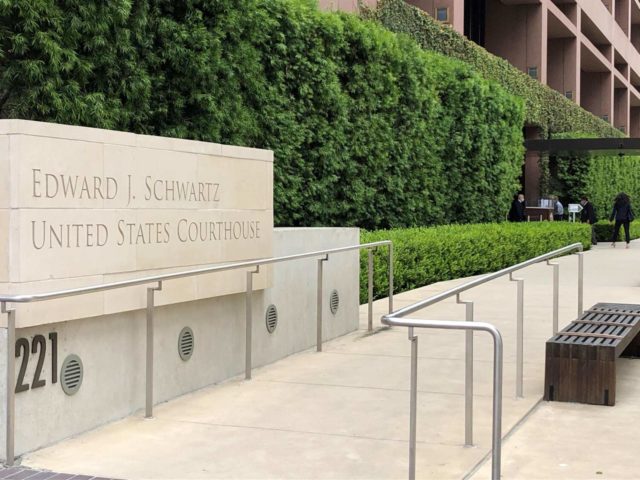
Prosecutors accused of improperly withholding prostitute evidence in ‘Fat Leonard’ Navy bribery trial The entrance to the Edward J. Schwartz U.S. Courthouse in downtown San Diego. (Kristina Davis/San Diego Union-Tribune/TNS)
The trial of five former naval officers charged with taking bribes from the military contractor known as “Fat Leonard” abruptly ground to a halt this week with accusations that prosecutors withheld exculpatory evidence that casts doubt on an alleged sexual tryst between a prostitute and one of the defendants.
Prosecutors admitted in court last week that they messed up: Federal investigators interviewed the prostitute in question last month but did not write up a timely report on the interview.
Defense attorneys contend prosecutors committed a much more egregious offense by violating the Brady Rule, which requires exculpatory evidence in the government’s possession to be turned over to the defense — a transgression that one lawyer said “undermines the integrity of the whole case.”
The controversy could change the course of the trial, now in its eighth week. On Monday, the prosecution team and the Naval Criminal Investigative Service agents who conducted the interview were expected to be under scrutiny as the judge holds a separate evidentiary hearing — outside the presence of the jury — to get to the bottom of the issue and determine how it may affect the case going forward.
“It is so totally disturbing,” U.S. District Judge Janis Sammartino told the prosecution team.
Sex with prostitutes is among the key bribes that Leonard Glenn Francis — nicknamed for his girth — is alleged to have plied U.S. Navy officers with in return for their military intelligence and official influence. Francis’ Singapore-based husbanding company serviced visiting Navy ships in ports across Southeast Asia for years, and he counted on the loyalty of strategically placed Navy officers to help line his pockets with millions in contract dollars.
The government’s 78-page indictment is chock full of allegations of naval officers — including the five on trial — embarking on corrupt escapades on Francis’ dime, from high-priced hotel suites to lavish dinners to parties with prostitutes.
The allegation at issue here is against former Capt. David Lausman, who in 2007 was commanding officer of the 7th Fleet’s command ship, the Blue Ridge, and later the aircraft carrier George Washington.
Prosecutors have said that he received the services of a tall prostitute named “Ina” at Francis’ expense in May 2008 at the Makati Shangri-La hotel in Manila, Philippines.
But when Lausman’s private investigator in late February tracked down the sex worker — her name correctly spelled “Ynah” — she denied having sex with Lausman, according to a motion filed late Wednesday by one of his defense attorneys, Laura Schaefer.
Ynah told the investigator that while Francis had hired her to entertain and have sex with a man known as “Too Tall” — Lausman’s nickname — that he did not want to and went to bed early, Schaefer said. Ynah said she asked if she could still go to his room with him, so she would still get paid, and he agreed; she slept on the couch and he in his bed, Schaefer said.
Ynah said she later lied to Francis, telling him that she and Lausman had had sex, to ensure she got paid, Schaefer said.
NCIS agents made contact with Ynah two weeks later — once the trial had already begun — and she told them a similar, but vaguer, story over the phone and in text messages, according to agents. She didn’t identify who the man was or give a date or location of the party, according to the agents’ summary.
Ynah later contacted Lausman’s investigator to say that she had talked to government agents.
However, the agents did not disclose the March 8 interview, or write a report about it, until Wednesday night — more than a month later — when the defense brought it up the judge in a motion.
The motion seeks to prohibit testimony from former Cmdr. Stephen Shedd, who has already pleaded guilty to bribery. He was expected to tell jurors that he saw Lausman leave the party in the hotel’s presidential suite with Ynah, that she spent the night in his hotel room, and that Lausman adamantly denied the next morning having sex with her, defense attorneys say.
“The prosecution seeks to introduce Mr. Shedd’s testimony to prove that Mr. Lausman accepted the services of a prostitute from Mr. Francis as a bribe, notwithstanding that the prosecution is in possession of very reliable information from the source, Ynah, that establishes that Mr. Lausman did not accept the services of a prostitute,” Schaefer wrote in her motion.
“Mr. Lausman’s statements, which the government characterizes as false and ‘self-serving,’ are the truth,” she continued. “But the government has no interest in the truth; it wants a conviction, at any cost.”
The U.S. attorney’s office said the failure to create a report on the interview was “an inadvertent oversight” and acknowledged that the agents and prosecution team “dropped the ball.”
However, prosecutors argued that they did not violate Brady, a rule named after the 1963 U.S. Supreme Court decision in Brady v. Maryland. That’s because the evidence was already in the possession of the defense team, and because Ynah’s statements to the government were so vague that they weren’t exculpatory, Assistant U.S. Attorney David Chu argued in a motion.
“I’d be very concerned if I was in your position, going full bore on this prosecution with the agent having dropped the ball in this fashion,” Sammartino chided the prosecutors Thursday. “The angst that this causes on the defense side. … They’ve got a lot of concerns about things falling through the cracks, and appropriately so.”
Jurors were sent home Thursday without hearing any testimony and told to return Tuesday or later, with the judge telling them the court had to sort out an unspecified “legal issue” in the case.
___
© 2022 The San Diego Union-Tribune Distributed by Tribune Content Agency, LLC




